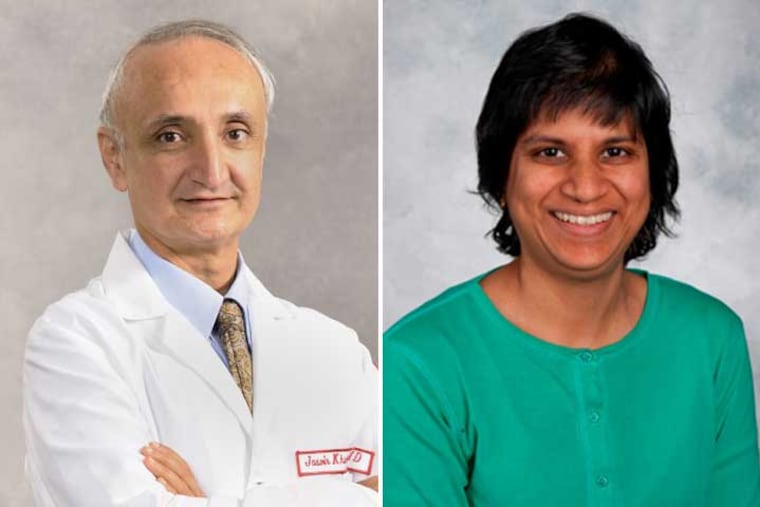‘A huge void’ left by death of husband-and-wife physicians after Montco plane crash
The physician researchers were known for their kindness as well as their medical acumen, colleagues said.

The Philadelphia medical community mourned the loss on Thursday of physician researchers Jasvir and Divya Khurana, who died in a plane crash along with their daughter Kiran, 19.
Jasvir Khurana, 60, was a professor of pathology and laboratory medicine at Temple University’s Lewis Katz School of Medicine, where he studied bone disease, including cancer and inflammation of bones in the foot due to diabetes. He also was a past president of the Pennsylvania Association of Pathologists.
Divya S. Khurana, 54, was a pediatric neurologist at St. Christopher’s Hospital for Children and a professor at Drexel University College of Medicine, where she was known for her study of cellular structures called mitochondria — a cutting-edge area of research that is thought to hold answers for a wide array of diseases. She explored the role that mitochondria play in epilepsy and autism, and also was known for her specialized expertise in sleep medicine.
Kiran, their younger daughter, graduated last year from Harriton High School in Bryn Mawr, where she was on a nationally ranked squash team and was active in theater productions.
Harriton principal Scott Weinstein said in a statement that Kiran was “one of our kindest students. She was humble, serving of others, and had an extremely bright future. We are deeply saddened by this tremendous loss.”
Jennifer Gelinas, co-president of the Harriton-Lower Merion Squash Booster Club, described Kiran and her parents as a "kind and loving family.”
The husband-and-wife physician-researchers both trained at the All India Institute of Medical Sciences and moved to the United States more than two decades ago.
At St. Christopher’s, neurology section chief Agustín Legido was Divya Khurana’s supervisor and research colleague, but considered her most of all to be a friend.
“She was loved by her patients and her students alike,” Legido said. “It has left a huge void in the hearts of everybody here at the hospital.”
Divya Khurana’s love for children was unending, said Jessica Wilson-Rule of Levittown, whose son was a patient of Khurana’s for 16 years.
When Wilson-Rule was a new mom and her then 15-month-old son was having epileptic seizures, “she took the time to listen to us and answer all my questions,” she said.
“Her compassion went well beyond the patient’s room. She called us after hours, and she’d come in when she wasn’t on call to be with us. She was very kind, and got down to his level when she was talking,” she said.
Jasvir Khurana, who worked at Penn Medicine before going to Temple in 2002, also was fondly remembered by his peers.
Former colleague Paul Zhang, a professor of pathology and laboratory medicine at Penn, said Khurana had worked as a surgeon in India, which gave him a valuable perspective when he switched to pathology in the United States — studying bones and soft tissues for signs of disease.
Much like his wife, Jasvir Khurana’s medical acumen was matched by his kindness of spirit, Zhang said.
“On a personal and professional level, he’ll be deeply missed,” Zhang said.
In an official statement, Temple University said: “Dr. Khurana has been a valued faculty member in the Department of Pathology at the Lewis Katz School of Medicine at Temple University since 2002. Our thoughts are with his family and loved ones.”
The Khuranas made their home on a quiet, tree-lined street in Lower Merion Township, 24 miles from the crash site.
They lived there with Jasvir’s parents, whom they often took long walks with, either alone or with Rusty, their energetic beagle-mix, according to neighbors.
Staff writers Robert Moran and Oona Goodin-Smith contributed to this article.